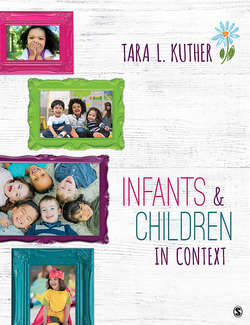Читать книгу Infants and Children in Context - Tara L. Kuther - Страница 39
На сайте Литреса книга снята с продажи.
Applying Developmental Science The Real-World Significance of Developmental Research
ОглавлениеIn its early years, the study of child development was based on laboratory research devoted to uncovering universal aspects of development by stripping away contextual influences. This basic research was designed to examine how development unfolds, with the assumption that development is a universal process with all children changing in similar ways and in similar time frames. In the early 1980s, influenced by contextual theories (such as Bronfenbrenner’s bioecological approach, discussed later in this chapter) and the growing assumption that children are active in their development, scientists began to examine developmental processes outside of the laboratory (Lerner, Johnson, & Buckingham, 2015b). It quickly became apparent that there are a great many individual differences in development that vary with a myriad of contextual influences. The field of applied developmental science emerged, studying individuals within the contexts in which they live and applying research findings to improve people’s lives.
Applied developmental science is a multidisciplinary field that unites scientists from around the world to examine and contribute to policies on issues that affect children, adolescents, adults, and their families, such as health and health care delivery, violence, and school failure. For example, some study contextual influences on development, such as the impact of environmental contaminants or poor access to clean water or the ways in which poverty influences children’s development and economic status later in life (Aizer, 2017; Gauvain, 2018; Golinkoff, Hirsh-Pasek, Grob, & Schlesinger, 2017; Huston, 2018). Developmental science research can help address global problems. For example, in September 2016, the United Nations defined and adopted the Sustainable Development Goals, a global consensus on 17 goals for supporting individuals and ensuring equity and health in all countries (United Nations General Assembly, 2015). Sample goals include ending poverty in all its forms everywhere; improving nutrition, health, and well-being for all people; promoting education and lifelong learning opportunities; and achieving gender equality and empowering all women and girls. The goals are broad in scope, and reaching them will require the knowledge and skills of applied developmental scientist researchers and practitioners from many disciplines working in interdisciplinary teams (Gauvain, 2018).
